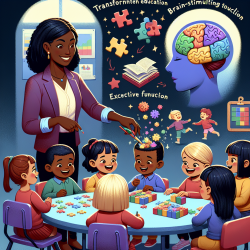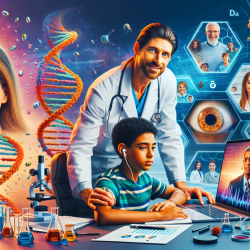Introduction
In the ever-evolving field of speech-language pathology, it is crucial for practitioners to stay informed and continuously refine their skills. By delving into historical research, such as the findings from "Introductory Lectures. No. 2," practitioners can gain valuable insights that inform modern practices. This blog post explores how the outcomes of this research can be applied to enhance online therapy services, particularly in school settings.
Key Insights from the Research
The research presented in "Introductory Lectures. No. 2" offers a comprehensive overview of early medical and surgical science discussions. Although published in 1848, the principles outlined in this paper can still be relevant today. Here are some key insights:
- Holistic Approach: The lectures emphasize the importance of considering the whole patient, a principle that remains vital in speech-language pathology. Practitioners should assess not only the speech and language abilities but also the emotional and social contexts of their clients.
- Continuous Learning: The research encourages ongoing education and adaptation. Speech-language pathologists should engage in continuous professional development to integrate new methodologies and technologies into their practice.
- Interdisciplinary Collaboration: The lectures highlight the value of collaboration across different medical fields. Similarly, online therapy practitioners should collaborate with educators, parents, and other professionals to create comprehensive treatment plans.
Implementing Historical Insights in Online Therapy
Integrating these historical insights into modern online therapy practices can lead to improved outcomes for children receiving services. Here are some strategies for implementation:
- Adopt a Holistic Framework: Use a holistic approach by incorporating assessments that evaluate the child's communication skills in various contexts. This can include family interviews and classroom observations conducted virtually.
- Commit to Lifelong Learning: Encourage practitioners to participate in webinars, online courses, and professional forums to stay abreast of the latest research and technological advancements in online therapy.
- Foster Interdisciplinary Teams: Create virtual teams that include teachers, parents, and other specialists to ensure a well-rounded approach to each child's therapy plan.
Encouraging Further Research
While the insights from "Introductory Lectures. No. 2" provide a strong foundation, practitioners should be encouraged to conduct further research. This can involve exploring contemporary studies that focus on the efficacy of online therapy, as well as investigating new technologies that can enhance service delivery.
Conclusion
By reflecting on historical research and integrating its principles into modern practice, speech-language pathologists can enhance their online therapy services. This approach not only benefits the practitioners but also contributes to better outcomes for the children they serve.
To read the original research paper, please follow this link: Introductory Lectures. No. 2.










